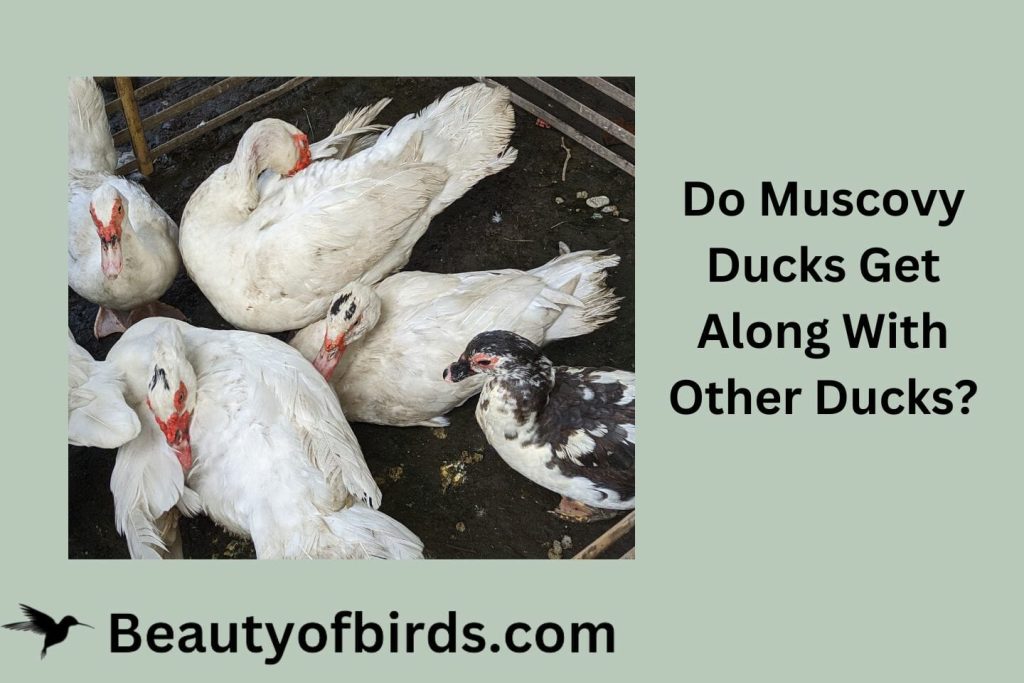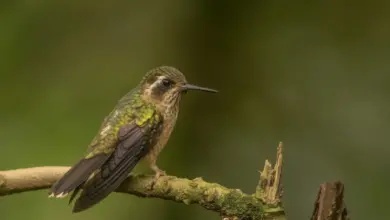Do Muscovy Ducks Get Along With Other Ducks?
Planning to raise muscovy ducks on your farm? Read on to find out if muscovy ducks get along with other ducks or you will have to make special arrangements for them.
Muscovy ducks are known for their impressive size, which makes them great as poultry animals for meat production.
But if you want to keep them on your farm, one question that will come to your mind is whether they get along well with other ducks.
The answer is: it depends!
Most of the time, muscovies are non-aggressive and friendly ducks. However, they can be a bit territorial at times.
In general, they don’t mind other duck species and can even mate with them.
In this article, I will explore the behavior of Muscovy ducks and their interactions with other breeds of ducks.

Can Muscovy Ducks Live With Other Ducks?
Muscovy ducks can generally live with other duck breeds quite peacefully.
They are quiet ducks, docile and undemanding in their living conditions.
They don’t require much – just give them plenty of space and opportunities to forage for insects and other food items, along with a large body of water nearby.
Letting them mix with other ducks can provide outside stimulation to keep them happy.
Can They Breed With Other Ducks?
Yes, muscovies can breed with other domestic ducks.
Ducks are relatively easy birds to interbreed as there is no significant genetic barrier between most species.
While muscovies have many characteristics that set them apart from other Mallard-derived duck species, they can certainly mate with ducks of that type.
Although the offspring may have a slightly different look or a few physical differences, it will still be recognizable as a duck.

But there is one caveat – compatible breeds, such as Pekins and Mallards, typically produce healthy hybrid offspring.
However, mallard (or other duck species) and muscovy breeds are sterile. They cannot produce offspring.
Do Muscovy Ducks Do OK With Other Ducks?
Muscovy ducks are generally quite tolerant of other duck breeds.
However, it’s important to keep in mind they do have their own unique traits and behaviors.
They tend to be much larger than other ducks and may try to dominate any pond or area they’re in.
If you’re keeping them with other ducks, ensure the numbers are even between Muscovy and non-Muscovy.
They usually get along fairly well with Pekins, Mallards, Rouens, Calls, and some Teals.
However, it is always best to introduce the two species slowly to each other so as not to cause any distress or bullying.
Since Muscovies are territorial creatures, consider fencing off the areas where they will live together to avoid fighting over turf rights.
Of course, if you have a large enough farm, each species will just find its own little nook or corner to stay in by itself.

Do Muscovy Ducks Get Along With Pekin Ducks?
Muscovy and Pekin Ducks can make great neighbors when kept in the same flock.
They tend to get along quite well.
However, because of varying temperaments, some Muscovys may be aggressive, especially the alpha males.
To ensure a peaceful living environment, consider whether or not your birds are compatible.
If you notice any signs of fighting or aggression when mixing your birds, separate them immediately.
Symptoms such as excessive hissing, feather flapping, and charging toward each other are sure signs of territorial aggression.
Can Muscovy Ducks Live With Mallards?
Yes, they can. However, if you choose to raise the two breeds together, you must be aware of the differences in their behavior.
The biggest difference will come from the fact that muscovies are much more aggressive than Mallards.
This can lead to fights and other problems if not separated and monitored carefully.

On the other hand, since they share many physical characteristics, breeding them together can also result in hybridization.
This produces sterile babies, which are great for duck meat production if that’s the reason why you are raising them.
In any case, it would be best to research thoroughly before considering combining these two breeds.
Are Muscovy Ducks Aggressive to Other Ducks?
Muscovy ducks get a bad rep for being aggressive, but this is often exaggerated.
Muscovy ducks are territorial and do sometimes get into squabbles with one another.
But they get along well with other ducks if given enough space.
Ducks of different species may not particularly like each other, but violent fights rarely happen.
Mixed flocks are more successful when the ducks don’t look alike. This helps keep group dynamics balanced.
So if you keep some variety in your flock of fowl, you shouldn’t have any trouble keeping a healthy peace between your birds.
How Do You Deal With Aggressive Muscovy Ducks?
Dealing with aggressive Muscovy ducks can be a challenge.
However, it’s possible to do so without resorting to harsh methods.
The key is to understand why they’re behaving aggressively in the first place.
For example, if they feel threatened or sense competition for food, providing them space and plenty of treats should keep them from getting hostile.

You can also train your ducks to respond better to commands through rewards.
Mating season is prime time for aggression. Males will try to establish dominance over others they see as competition.
Female ducks, on the other hand, tend to get aggressive and protective when they are brooding.
They will not let anyone near their eggs but don’t really start fights.
It is best to provide ample space and a healthy duck-to-drake ratio at such times.
Finally, if you’re still having trouble, consider consulting with a professional animal behaviorist.
Can You Keep Male Muscovies Together?
As I said above, male muscovies cohabitating can be a tricky balance.
It is not recommended to keep male ducks together.
They compete considerably for breeding rights and will likely become aggressive toward one another, especially when territorial boundaries are not established.
If you do decide to house multiple males in the same space, ensure they have enough room to move around freely.
Make sure each male gets a fair chance to mate with females. This will help curb competition.
Providing a large water source, vegetation, branches to roost on, and nesting boxes can help reduce competition.

Will New Muscovy Ducks Settle Into Pecking Order?
Muscovy ducks establish a pecking order within their flock once they settle in.
This social order helps keep tensions within the flock minimum and generally allows them to coexist peacefully.
The dominant duck is usually the oldest or largest male.
He will typically take precedence regarding resources like food and perching spots.
He will usually also be the one who gets his pick of females to mate with.
Disputes can arise between birds even after establishing their pecking order, especially among the younger ones.
That said, if there is any noticeable aggression or bullying within your flock, then it could be worth trying to separate some of the birds.
Frequently Asked Questions
Do muscovy ducks mate for life?
The next season, they would just as easily mate with a different muscovy and don’t care who they raised a family with earlier.
Male Muscovy ducks don’t have much of a role in raising the hatchlings. But still, during the season, they stick around and help out as best they can.
This might involve guarding the eggs and protecting the clutch from predators.
Are Muscovy ducks a problem?
By nature, Muscovy ducks like to congregate in large groups on lawns and other spaces, which can lead to fouling of the area with feathers and droppings.
Their feces can cause both health and cleanliness-related problems.
In addition, large populations of Muscovy ducks have been known to cause damage to property and vegetation and compete with native bird species for food sources.
Domesticated ducks usually do not have such problems.
Will Muscovy ducks adopt other ducklings?
There are two reasons for this.
Firstly, muscovy chicks do not look any different from other duck babies till at least fifteen weeks of age.
It is entirely possible that the female simply won’t recognize a chick from another flock among her own.
Secondly, muscovy females have a strong maternal instinct. They might simply not mind having another little duckling to care for.
Are Muscovy ducks friendly?
They have certain needs, and as long as those are fulfilled, they are happy-go-lucky ducks.
You need to offer them ample space, a place to nest and roost, enough opportunities to forage for insects on their own (or else give them food yourself), and a large body of water nearby.
During mating season, there should be a healthy ratio of males and females (at most 4:1, not more).
If all of the above points are satisfied, these ducks will not cause many problems on your farm.
Wrap Up
Overall, Muscovy ducks can get along with other ducks quite well.
Ensure to provide enough space to establish their nesting territories. They should get enough food, water, and opportunities to mate.
Female muscovies can get aggressive when they are brooding because they are very protective of their young.
Although Muscovys may be territorial at times, they have the potential to become companions in a mixed duck flock of many different species.
As with any other waterfowl species, there will be occasional squabbles of dominance.
Generally speaking, Muscovys do mix peacefully with other ducks when they get all of the above.
With a little bit of patience and understanding, both species can happily coexist together.




